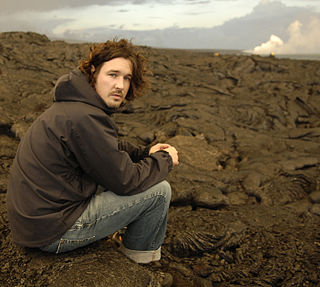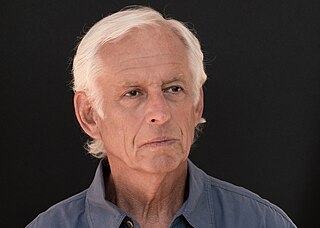Jason Langer | |
|---|---|
| Born | 1967 (age 55–56) Tucson, Arizona |
| Alma mater | University of Oregon |
| Occupation | Photographer |
Jason Langer (born 1967) is an American photographer best known for this psychological and noirish visions of contemporary urban life. [1] [2]
Jason Langer | |
|---|---|
| Born | 1967 (age 55–56) Tucson, Arizona |
| Alma mater | University of Oregon |
| Occupation | Photographer |
Jason Langer (born 1967) is an American photographer best known for this psychological and noirish visions of contemporary urban life. [1] [2]
Langer was born in Tucson, Arizona, USA and grew up in Ashland, Oregon. Langer studied photography at the University of Oregon from 1985 to 1989. [3] After graduation, Langer moved to San Francisco and apprenticed with some of the Bay area's most famous photographers including Ruth Bernhard, Arthur Tress, and Michael Kenna, [4] [5] who became his mentor and lifelong friend. [6] During that time, Langer learned much from Michael Kenna and influences from Kenna remain present throughout Langer's two-decades of photographic work. [7]
Langer shoots using film, meaning that he does not know exactly what photographs he has until the film is developed. He photographs in black and white and prefers to photograph at night. [2] He avoids photographing human faces, which increases the mystery of his works. [4]
Langer is represented by galleries in Europe and North America: Michael Shapiro (New York and East Coast), Esther Woerdehoff (Paris), and Charles A. Hartman, Fine Art (Portland, OR).

Martin Parr is a British documentary photographer, photojournalist and photobook collector. He is known for his photographic projects that take an intimate, satirical and anthropological look at aspects of modern life, in particular documenting the social classes of England, and more broadly the wealth of the Western world.
Robert Adams is an American photographer who has focused on the changing landscape of the American West. His work first came to prominence in the mid-1970s through his book The New West (1974) and his participation in the exhibition New Topographics: Photographs of a Man-Altered Landscape in 1975. He has received two Guggenheim Fellowships, a MacArthur Fellowship, the Deutsche Börse Photography Prize and the Hasselblad Award.

Esther Bubley was an American photographer who specialized in expressive photos of ordinary people in everyday lives. She worked for several agencies of the American government and her work also featured in several news and photographic magazines.

Stephen Shore is an American photographer known for his images of scenes and objects of the banal, and for his pioneering use of color in art photography. His books include Uncommon Places (1982) and American Surfaces (1999), photographs that he took on cross-country road trips in the 1970s.
John Gossage is an American photographer, noted for his artist's books and other publications using his photographs to explore under-recognised elements of the urban environment such as abandoned tracts of land, debris and garbage, and graffiti, and themes of surveillance, memory and the relationship between architecture and power.

Night photography refers to the activity of capturing images outdoors at night, between dusk and dawn. Night photographers generally have a choice between using artificial lighting and using a long exposure, exposing the shot for seconds, minutes, or even hours in order to give photosensitive film or an image sensor enough time to capture a desirable image. With the progress of high-speed films, higher-sensitivity digital sensors, wide-aperture lenses, and the ever-greater power of urban lights, night photography is increasingly possible using available light.

Michael Kenna is an English photographer best known for his unusual black and white landscapes featuring ethereal light achieved by photographing at dawn or at night with exposures of up to 10 hours. His photos concentrate on the interaction between ephemeral atmospheric condition of the natural landscape, and human-made structures and sculptural mass.

Kenro Izu is a Japanese-born photographer based in the United States. He is the founder of children's charity Friends Without a Border, for which he has received two awards. He has also been awarded for his photography.
Kikuji Kawada is a Japanese photographer. He co-founded the Vivo photographic collective in 1959. Kawada's books include Chizu and The Last Cosmology (1995). He was included in the New Japanese Photography exhibition at the Museum of Modern Art, New York in 1974 and was awarded the Lifetime Achievement Award from the Photographic Society of Japan in 2011.

Todd Hido is an American photographer. He has produced 17 books, had his work exhibited widely and included in various public collections. Hido is currently an adjunct professor at the California College of the Arts in San Francisco.
Andrea Modica is an American photographer and professor of photography at Drexel University. She is known for portrait photography and for her use of platinum printing, created using an 8"x10" large format camera. Modica is the author of many monographs, including Treadwell (1996) and Barbara (2002).
Yuichi Hibi is a Japanese fine art photographer currently living and working out of New York City.

Bil Zelman is an American photographer and director known for his powerful, candid portraiture and spontaneous, photojournalistic style. Zelman developed a highly stylized form of hard-flash street photography while in art school and Los Angeles Times art critic Leah Ollman compares the "psychological density" of his work to the likes of Garry Winogrand, Larry Fink, Diane Arbus and William Klein- photographers that are "purposely getting it wrong in one way so as to get it right in another, disrupting visual order to ignite a kind of visceral disorder".

Connie Imboden was born in 1953 and is an American photographer known for her work in nudes, using reflections in water and mirrors. Her photographs are represented in many collections including The Museum of Modern Art in New York, The Museum of Modern Art in San Francisco, The Philadelphia Museum of Art, Bibliothèque nationale de France in Paris, the Ludwig Museum in Cologne, Germany, as well as many other public and private collections throughout Europe and the Americas.

William Jay was a photographer, writer on and advocate of photography, curator, magazine and picture editor, lecturer, public speaker and mentor. He was the first editor of "the immensely influential magazine" Creative Camera (1968–1969); and founder and editor of Album (1970–1971). He is the author of more than 20 books on the history and criticism of photography, and roughly 400 essays, lectures and articles. His own photographs have been widely published, including a solo exhibition at the San Francisco Museum of Modern Art. He is known for his portrait photographs of photographers.

Richard M. Ehrlich is a surgeon and photographer. Born in New York City on March 12, 1938, he obtained a BA in 1959 from Cornell University, where he was a member of the Quill and Dagger society. He has been a professor and physician for over 40 years, and has been recognized as a fine art photographer. The New York Times said his photographs "suggest ephemerality from a broader historical perspective" and that they "look like staged fantasies".
Doug Rickard was an American artist and photographer. He used technologies such as Google Street View and YouTube to find images, which he then photographed on his computer monitor. His photography has been published in books, exhibited in galleries and held in the permanent collection of the San Francisco Museum of Modern Art. Rickard was best known for his book A New American Picture (2010). He was founder and publisher of the website on contemporary photography, American Suburb X, and the website These Americans which published some of his collection of found photographs.
Nazraeli Press is a publisher of books of photography. It was founded in 1989, in Munich, Germany, by Chris Pichler and has been based in the US since 1996.
Dick Arentz is an American fine art photographer and author, known for his textbook on platinum-palladium printing. Arentz's text book, Platinum & Palladium Printing, Focal Press. 1st edition (1999), 2nd edition (2004) “is known in online forums and industry magazines as the most comprehensive book on the subject.” Other photography insiders such as Dr. Michael J. Ware and Bill Jay have commended the author as a master-craftsman in platinum-palladium printing. Arentz has mentored other photographers in the platinum-palladium printing process by conducting more than 40 workshops for organizations such as The Center for Creative Photography, The Friends of Photography and The Museum of Photographic Arts. His work was displayed at over fifty one-man exhibits in museums and private galleries in the US and Europe.
Lucas Foglia is an American photographer, living in San Francisco. "His work is concerned mainly with documenting people and their relationship to nature", for which he has travelled extensively making landscape photography and portraiture.